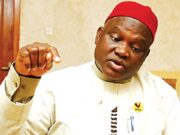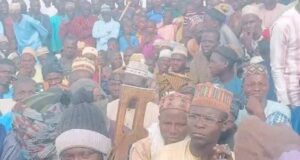 Advertorial
Advertorial
Business owners in Bauchi, Gombe, and Jigawa are experiencing significant losses due to a week-long blackout caused by vandalism of power transmission lines in northern Nigeria.
The extended disruption in electricity supply has adversely affected essential services such as water, sanitation, street lighting, and healthcare, with many hospitals operating without power.
Local shopkeepers, millers, and artisans shared their frustrations with the News Agency of Nigeria (NAN), labeling the situation as “pathetic.”
 Advertorial
Advertorial
The survey highlighted the chronic issues of national grid failures and the urgent need for alternative power sources.
Rice millers in Gombe have particularly lamented the effects of inconsistent power supply on their operations.
Musa Arab, a miller located in Nassarawo Industrial Layout, emphasized that power outages have crippled their processing capabilities, as they rely on grid electricity to operate their machinery.
The soaring costs of petrol and diesel have made it unaffordable for them to use generators, leading to decreased rice supply and raising concerns over food security.

Arab stated, “We must invest in power because it is the biggest determining factor for industries to thrive. I have over 20 workers in my mill, and we have 100 mini rice mills here, so you can imagine those who have no jobs for the past 10 days. The government must take strong action against those responsible for the recurring grid failures, as it appears some may be profiting from it.”
Yusuf Ibrahim warned that the blackout could exacerbate inflation, as prices for local rice varieties have already begun to rise due to diminished supply.
He noted that some sellers have increased their prices to offset diesel expenses, impacting overall rice prices.
 Advertorial
Advertorial
A check by NAN at the Gombe Main market revealed that a 100-kilogram bag of rice now sells for between N120,000 and N160,000, up from N110,000 to N150,000 prior to the blackout.
Rice dealer Usman Sani explained that while prices initially fell with the harvest, they have since surged due to power outages.
Ugochukwu Daniel, a bartender in Bauchi, criticized the unreliable electricity supply, stating that consistent energy is vital for Nigeria’s social and economic advancement.
 Advertorial
Advertorial
He mentioned spending heavily on fuel for generators to keep his restaurant operational.
“My trade depends on chilled drinks, and without electricity, it’s impossible to maintain business. We need stable electricity for prosperity,” he said.
Similarly, Samuel Adamu expressed that ongoing power outages have forced him to resort to charcoal for ironing clothes, despite its increased cost.
He noted that the price for charcoal has skyrocketed from N5,000 to N15,000, prompting a shift in how laundry services are structured to manage expenses.
 Advertorial
Advertorial
To mitigate these challenges, Adamu advocated for the development of renewable energy sources and called on security agencies to enhance the protection of electrical installations.
In related news, Muhammad Adamu, Chairman of the Jigawa State House Assembly Committee on Power and Energy, announced that the Jigawa Electricity Law 2024 aims to improve power generation and distribution within the state.
This legislation arises from changes in the constitution that shifted power regulation from the executive to the legislative domain.
 Advertorial
Advertorial
“The new law will establish the Jigawa Electricity Commission, ensuring the regulation of the electricity market while protecting residents and investors. It will facilitate reliable and affordable power essential for economic development, especially in rural areas,” Adamu stated.
He emphasized that addressing vandalism is critical, as communities often bear the financial burden for repairs when issues arise with power supply, despite payments made to the Kano Electricity Distribution Company (KEDCO) for services.

















